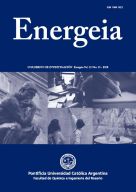Please use this identifier to cite or link to this item:
https://repositorio.uca.edu.ar/handle/123456789/5878| Título: | Proyecto Marginalidad urbana y organizaciones de la sociedad civil en el Barrio San Francisquito de la ciudad de Rosario : el barrio San Francisquito : una mirada construida participativamente Urban marginality project and civil society organizations in the San Francisquito neighborhood of the city of Rosario : the Barrio San Francisquito : a view built participatively |
Autor: | Aradas Díaz, María Elena Enria, Graciela Dachesky, Melina Fernández, Carlos |
Palabras clave: | RELACION ESCUELA-COMUNIDAD; MOVIMIENTOS SOCIALES; MARGINALIDAD; POBREZA; IGLESIA CATOLICA | Fecha de publicación: | 2018 | Editorial: | Universidad Católica Argentina. Facultad de Química e Ingeniería "Fray Rogelio Bacon". Departamento de Investigación Institucional | Cita: | Aradas Díaz, M. E. et al. Proyecto Marginalidad urbana y organizaciones de la sociedad civil en el barrio San Francisquito de la ciudad de Rosario : el barrio San Francisquito : una mirada construida participativamente [en línea]. Energeia, 15(15), 2018. Disponible en: http://bibliotecadigital.uca.edu.ar/greenstone/cgi-bin/library.cgi?a=d&c=Revistas&d=proyecto-marginalidad-urbana-organizaciones [Fecha de consulta: …..] | Resumen: | Resumen: Este artículo contiene una síntesis de la publicación “El Barrio San Francisquito: una mirada construida participativamente” que da cierre al proyecto de investigación Marginalidad Urbana y organizaciones de la sociedad civil en el Barrio San Francisquito. En la misma, compartimos los enfoques teóricos metodológicos y los principales hallazgos del proyecto. El marco teórico considera cuatro ejes analíticos: marginalidad urbana, capacidades del desarrollo humano, organizaciones de la sociedad civil (OSC) y justicia ambiental, en el marco del desarrollo humano. Desde estos ejes se incorporan asimismo temáticas de los contextos conceptuales de segregación y fragmentación territorial, del derecho a la ciudad, autonomía y agencia de los más marginados. Con estas perspectivas se ahonda en el objeto de estudio, población barrial y organizaciones, desde una comprensión multidimensional de la pobreza y con la dimensión medioambiental como eje transversal. La metodología de investigación acción participativa, utiliza herramientas de recolección de datos con entrevistas-encuestas analizadas desde técnicas cuali- cuantativas. Entre los resultados mas relevantes se menciona la desconfianza y la inseguridad, por lo que el desafío es continuar reconstruyendo el tejido social barrial, para lo cual como estrategia se inició un proceso interinstitucional denominado TEJIENDO REDES, constituyéndose en un dispositivo socioterritorial, que permita continuar las acciones y gestionar el “Derecho a la Ciudad”, poniendo en valor los aportes, las capacidades y la institucionalidad barrial. Abstract: This article contains a summary of the publication "El Barrio San Francisquito: a participatively constructed view" that closes the Urban Marginality research project and civil society organizations in the San Francisquito neighborhood. In it, we share the theoretical methodological approaches and the main findings of the project. The theoretical framework considers four analytical axes: urban marginality, human development capacities, civil society organizations (CSO) and environmental justice, within the framework of human development. From these axes are also incorporated the themes of the conceptual contexts of segregation and territorial fragmentation, of the right to the city, autonomy and agency of the most marginalized. With these perspectives, the object of study, neighborhood population and organizations is deepened, from a multidimensional understanding of poverty and with the environmental dimension as a transversal axis. The methodology of participatory action research uses data collection tools with interviews-surveys analyzed from qualitative techniques. Among the most relevant results is the mistrust and insecurity, so the challenge is to continue rebuilding the social fabric of the neighborhood, for which an interinstitutional process called TEJIENDO REDES was initiated as a strategy, constituting a socio-territorial device that allows continuing the actions and manage the "Right to the City", valuing the contributions, capacities and neighborhood institutionality. |
URI: | https://repositorio.uca.edu.ar/handle/123456789/5878 | ISSN: | 1668-1622 | Disciplina: | INGENIERIA | Derechos: | Acceso Abierto | Fuente: | Energeia, Vol. 15, Nº 15, 2018 ISSN 1668-1622 |
| Appears in Collections: | ENE 2018 Año 15 nro. 15 |
Files in This Item:
| File | Description | Size | Format | |
|---|---|---|---|---|
| proyecto-marginalidad-urbana-organizaciones.pdf | 387,97 kB | Adobe PDF |  View/Open |
Page view(s)
123
checked on Apr 30, 2024
Download(s)
151
checked on Apr 30, 2024
Google ScholarTM
Check
This item is licensed under a Creative Commons License

